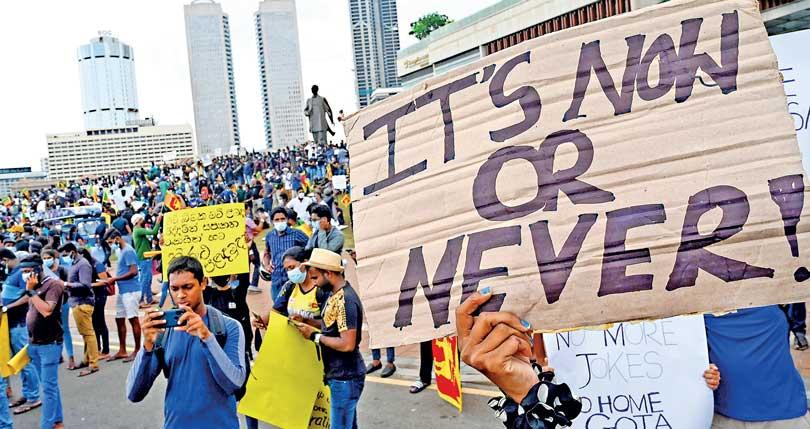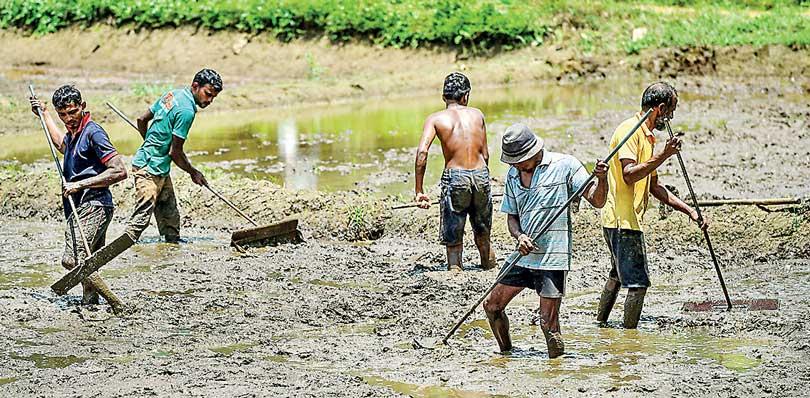30 Jan 2024 - {{hitsCtrl.values.hits}}

Addressing the issues faced by youth is a significant challenge faced by every government from a global perspective; underscoring the fundamental responsibility of any regime to comprehend the thinking of the youth

Older individuals often have a higher likelihood of securing jobs compared to younger individuals; primarily because the former possess qualifications required for employment such as experience, ability to take responsibility and be accountable
It is evident that the issue of youth unemployment has arisen from factors such as youth immaturity, a lack of systematic education and professional training, and economic hardships
State Minister for Finance Ranjith Siyambalapitiya maintains that individuals should not be pressured to pay taxes simply because they have a Tax Identification Number, and there is no need to fear such consequences
As young people embark on their journey to achieve goals and dreams, these tax systems act as hindrances. Taxing their income, assets, or other means makes it challenging for them to fulfill their objectives. Under the current tax policy, they are required to pay 30 percent of their income as tax, leaving the youth ‘penniless’
 This article has been compiled on youth unrest in Sri Lanka in keeping with an analysis made by former Director of Agriculture K.B Gunaratne based on data from the Department of Census and Statistics and the Central Bank of Sri Lanka on certain programmes carried out by the Government of Sri Lanka. These programmes have left Sri Lankan youth in an unsettled state and not forgetting the damage caused to the country.
This article has been compiled on youth unrest in Sri Lanka in keeping with an analysis made by former Director of Agriculture K.B Gunaratne based on data from the Department of Census and Statistics and the Central Bank of Sri Lanka on certain programmes carried out by the Government of Sri Lanka. These programmes have left Sri Lankan youth in an unsettled state and not forgetting the damage caused to the country.
Addressing the issues faced by youth is a significant challenge faced by every government from a global perspective. It is also a fundamental responsibility of a government to comprehend the thinking of the youth and launch programmes that meet their needs. The youth comprise the backbone of the country and the current government should help them in the face of economic hardships, unemployment and despair. This involves understanding and tackling issues that impact the younger generation.
Youth are an asset for any country. If this resource can be harnessed for the betterment of the nation, that country can be termed fortunate. In 1977, 1988-89 and 2022 there were youth uprisings because the rulers ignored the issues affecting them. A person aged between 15 and 24 is commonly recognised as a youth; which reflects the global understanding of who belongs to this age group. However, the National Youth Policy Committee appointed by the Government of Sri Lanka has expanded this definition to include individuals between the ages of 13 and 30 as youth. More than one billion, or one-fifth of the world’s population, falls within this category.
Youth constitute 33 percent of Sri Lanka’s total population; which would be approximately 7.3 million out of the total population, which is 22 million. When taking into account the education of this group, the first-grade enrollment rate stands at 94 percent. The tendency to drop out of school, commences at the age of 11 in grade six and reaches its peak at age 16 which is in grade 11. This dropout rate approximately is 40 percent of students when one takes into account grade 11. Additionally, 6 percent of the youth doesn’t receive any education in a school. As individuals in this group make the transition from boy to young adult they enter the workforce as labourers or individuals with similar backgrounds because of the challenges of living in a society marked by poverty. This compels them to strive for the financial well-being of their families.
This is primarily attributed to poverty or the inability to have access to education. Another contributing factor is the frustration stemming from not passing the GCE Ordinary Level Exam or not being able to appear for the examination. Regardless of the level of education, the literacy rate in Sri Lanka stands at 92 percent. Additionally, the country has a well-organised school system with approximately 10,000 schools operating throughout the country. With one school for every 6.7 square kilometres, each teacher caters to 20 children in a single school. However, there are no initiatives to reintegrate dropouts and truants back into the educational system. Immediate implementation of such a programme is essential. It is regrettable that the existing governments have yet to take action on this matter.
While vocational training programmes are being implemented by institutes to cater to children- who drop out of the education stream in the country- their effectiveness is occasionally constrained by resource distribution challenges. Thus, there is a need for the implementation of vocational training programmes tailored to the specific needs of regions, villages, cities, and the overall country. The responsibility for paving the way for such initiatives lies with the existing governments. These programmes should encompass various industries, promote self-employment and offer opportunities to work in diverse professions suitable for youth.
Earning money through illegal means
Unemployment is a significant barrier affecting the youth of Sri Lanka and several factors directly contribute to this challenge. Older individuals often have a higher likelihood of securing jobs compared to younger individuals; primarily because they possess additional qualifications required for employment. Experience, responsibility and accountability stand in favour of older individuals. In this context, the aspirations of the youth are often thwarted; making it challenging for them to contribute their labour to the country’s development. The capacity to generate employment opportunities also diminishes concurrently; directly impacting the overall unemployment rate in the country. Presently, the youth unemployment rate is 32 percent, with 15-16 year-olds falling into a category of 22 percent who are unemployed. Those falling into the age group between 20-24 represent 40 percent of the population while those falling into the age group between 25-29 represent 35 percent of the population. It is evident that the issue of youth unemployment has arisen from factors such as youth immaturity, a lack of systematic education and professional training, and economic hardships; prompting some individuals to explore alternative avenues for income. This has led to an inclination towards illegal means of earning money, as some individuals are drawn towards careers involving criminal activities, theft, drug dealing, and prostitution.
Youth unemployment rates vary across different areas, with 25 percent in the city, 33 percent in rural areas and 29 percent in estate areas. Consequently, rural youth encounter the most significant challenges; receiving fewer job opportunities. When analysts break down the data by gender, unemployment stands at 30 percent for men and 32 percent for women. Additionally, women are engaged in self-employment, generating income through such endeavours.
Commencing this year, the government made it mandatory for all individuals above the age of 18 to obtain a Tax Identification Number (TIN). Despite the limited facilities provided for this process, approximately 500,000 people are experiencing significant challenges. State Minister for Finance Ranjith Siyambalapitiya maintains that individuals should not be pressured to pay taxes simply because they have a Tax Identification Number, and there is no need to fear such consequences. However, concerns arise regarding the threat of a fine of 50,000 rupees for those who fail to initiate the process. Instead, the focus should have been on issuing Tax Identification Numbers to all individuals listed on the electoral register, without turning this into a social problem. The Electoral Register lists all individuals above the age of 18. Information about assets such as electrical appliances in a house, vehicles, trees in the garden, were obtained earlier through Grama Niladhari officials. The purpose behind these measures remains unclear to the public.
However, even if the government claims to gather this information in good faith, it can still explore alternative methods to collect taxes from residents, considering that people typically provide accurate income reports. The people are honest in disclosing information regarding income. Therefore, the government has the option to implement a property tax system to enhance revenue.
The president himself stated that a wealth tax or death duty will be imposed from the next year. If implemented, it is the youth of this country who will bear the brunt of this tax burden. This is particularly problematic because young individuals are currently navigating a transitional period in their lives. When they start earning more than Rs 100,000 per month through entrepreneurial ventures or other employment opportunities, the government can calculate their income and collect taxes. As young people embark on their journey to achieve goals and dreams, these tax systems act as hindrances. Taxing their income, assets, or other means makes it challenging for them to fulfill their objectives. Under the current tax policy, they are required to pay 30 percent of their income as tax, leaving the youth ‘penniless’.
Young individuals engaged in agriculture, are increasingly reluctant to continue in this sector due to the lack of an income. They do not earn a sufficient income to compensate for their hard work. Consequently, these tax policies appear to be hindering the ability of young people to build their lives.
Furthermore, it is essential to assess the overall health—physical, mental, and environmental—of the younger generation amidst prevalent poverty. Insufficient health facilities in the face of poverty contribute to the vulnerability of youth to various diseases. Some struggle with stress and commit suicide, and some get addicted to drug use. Twenty five (25) percent of Sri Lanka’s population is malnourished, 18 percent lacks access to safe sanitary facilities, and 50 percent of older women suffer from iron deficiency. These issues cause mental health problems among youth due to the economic problems associated with poverty. Twenty (20) percent of Sri Lanka’s population grapples with mental disorders; which indicate that one out of every 5 citizens faces such challenges—a truly disheartening situation.
Suicide is the leading cause of death among individuals aged between 15-19; hence this demands urgent attention from the government. Sri Lanka is currently ranked 129th among 149 countries in terms of suicide rates. Sri Lanka held the 116th position in 2018 in this regard, 130th in 2020 and 129th in 2021, reflecting a concerning tragedy for the country. Moreover, 30 percent of the country’s youth believe that their votes will not contribute to responsible development. Half of the youth population lacks trust in any political party or activity. Additionally, 78 percent of young people do not perceive the current Sri Lankan society as fair and just and that is a misfortune.
The government needs to address these issues proactively. In the midst of the current economic crisis, securing government jobs has become a distant aspiration. Simultaneously, unemployment has surged in the private sector, compelling many young people to seek opportunities abroad; resulting in a brain drain. Youth seeking foreign employment directly impacts the country’s development and contributes to growing frustration among the younger population. It becomes imperative for the government to take responsibility for safeguarding the youth. Failure to do so may result in a scenario where the youth must pay a significant portion of their earnings as government taxes. The government has struggled to establish a job market for young graduates graduating from universities or institutes. The government has failed to engage the youth- who endure significant challenges during their university years- productively for the benefit of the country. Regrettably, it must be acknowledged, that the government compounds the frustration of these young individuals by imposing taxes on them before they even embark on their lives.
04 Jan 2025 4 hours ago
04 Jan 2025 4 hours ago
04 Jan 2025 5 hours ago
04 Jan 2025 5 hours ago
04 Jan 2025 5 hours ago